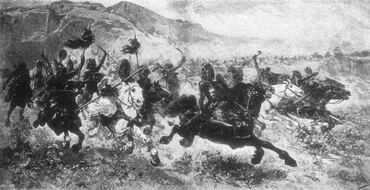1
これはあなたの先祖たちの神、主が所有として賜わる地で、あなたがたが世に生きながらえている間、守り行わなければならない定めと、おきてである。
2
あなたがたの追い払う国々の民が、その神々に仕えた所は、高い山にあるものも、丘にあるものも、青木の下にあるものも、ことごとくこわし、
3
その祭壇をこぼち、柱を砕き、アシラ像を火で焼き、また刻んだ神々の像を切り倒して、その名をその所から消し去らなければならない。
4
ただし、あなたがたの神、主にはそのようにしてはならない。
5
あなたがたの神、主がその名を置くために、あなたがたの全部族のうちから選ばれる場所、すなわち主のすまいを尋ね求めて、そこに行き、
6
あなたがたの燔祭と、犠牲と、十分の一と、ささげ物と、誓願の供え物と、自発の供え物および牛、羊のういごをそこに携えて行って、
7
そこであなたがたの神、主の前で食べ、あなたがたも、家族も皆、手を労して獲るすべての物を喜び楽しまなければならない。これはあなたの神、主の恵みによって獲るものだからである。
8
そこでは、われわれがきょうここでしているように、めいめいで正しいと思うようにふるまってはならない。
9
あなたがたはまだ、あなたがたの神、主から賜わる安息と嗣業の地に、はいっていないのである。
10
しかし、あなたがたがヨルダンを渡り、あなたがたの神、主が嗣業として賜わる地に住むようになり、さらに主があなたがたの周囲の敵をことごとく除いて、安息を与え、あなたがたが安らかに住むようになる時、
11
あなたがたの神、主はその名を置くために、一つの場所を選ばれるであろう。あなたがたはそこにわたしの命じる物をすべて携えて行かなければならない。すなわち、あなたがたの燔祭と、犠牲と、十分の一と、ささげ物およびあなたがたが主に誓ったすべての誓願の供え物とを携えて行かなければならない。
12
そしてあなたがたのむすこ、娘、しもべ、はしためと共にあなたがたの神、主の前に喜び楽しまなければならない。また町の内におるレビびととも、そうしなければならない。彼はあなたがたのうちに分け前がなく、嗣業を持たないからである。
13
慎んで、すべてあなたがよいと思う場所で、みだりに燔祭をささげないようにしなければならない。
14
ただあなたの部族の一つのうちに、主が選ばれるその場所で、燔祭をささげ、またわたしが命じるすべての事をしなければならない。
15
しかし、あなたの神、主が賜わる恵みにしたがって、すべて心に好む獣を、どの町ででも殺して、その肉を食べることができる。すなわち、かもしかや雄じかの肉と同様にそれを、汚れた人も、清い人も、食べることができる。
16
ただし、その血は食べてはならない。水のようにそれを地に注がなければならない。
17
あなたの穀物と、ぶどう酒と、油との十分の一および牛、羊のういご、ならびにあなたが立てる誓願の供え物と、自発の供え物およびささげ物は、町の内で食べることはできない。
18
あなたの神、主が選ばれる場所で、あなたの神、主の前でそれを食べなければならない。すなわちあなたのむすこ、娘、しもべ、はしため、および町の内におるレビびとと共にそれを食べ、手を労して獲るすべての物を、あなたの神、主の前に喜び楽しまなければならない。
19
慎んで、あなたが世に生きながらえている間、レビびとを捨てないようにしなければならない。
20
あなたの神、主が約束されたように、あなたの領域を広くされるとき、あなたは肉を食べたいと願って、『わたしは肉を食べよう』と言うであろう。その時、あなたはほしいだけ肉を食べることができる。
21
もしあなたの神、主がその名を置くために選ばれる場所が、遠く離れているならば、わたしが命じるように、主が賜わる牛、羊をほふり、門の内で、ほしいだけ食べることができる。
22
かもしかや、雄じかを食べるように、それを食べることができる。すなわち汚れた人も、清い人も一様にそれを食べることができる。
23
ただ堅く慎んで、その血を食べないようにしなければならない。血は命だからである。その命を肉と一緒に食べてはならない。
24
あなたはそれを食べてはならない。水のようにそれを地に注がなければならない。
25
あなたはそれを食べてはならない。こうして、主が正しいと見られる事を行うならば、あなたにも後の子孫にも、さいわいがあるであろう。
26
ただあなたのささげる聖なる物と、誓願の物とは、主が選ばれる場所へ携えて行かなければならない。
27
そして燔祭をささげる時は、肉と血とをあなたの神、主の祭壇の上にささげなければならない。犠牲をささげる時は、血をあなたの神、主の祭壇にそそぎかけ、肉はみずから食べることができる。
28
あなたはわたしが命じるこれらの事を、ことごとく聞いて守らなければならない。こうしてあなたの神、主が見て良いとし、正しいとされる事を行うならば、あなたにも後の子孫にも、長くさいわいがあるであろう。
29
あなたの神、主が、あなたの行って追い払おうとする国々の民を、あなたの前から断ち滅ぼされ、あなたがついにその国々を獲て、その地に住むようになる時、
30
あなたはみずから慎み、彼らがあなたの前から滅ぼされた後、彼らにならって、わなにかかってはならない。また彼らの神々を尋ね求めて、『これらの国々の民はどのようにその神々に仕えたのか、わたしもそのようにしよう』と言ってはならない。
31
あなたの神、主に対しては、そのようにしてはならない。彼らは主の憎まれるもろもろの忌むべき事を、その神々にむかって行い、むすこ、娘をさえ火に焼いて、神々にささげたからである。
32
あなたがたはわたしが命じるこのすべての事を守って行わなければならない。これにつけ加えてはならない。また減らしてはならない。







